|

A
World of Languages | Behind
the Scenes at the Winter Olympics | International
Programs Advisory Council | Making
a World of Difference in Asia | Leonard
Leads Changes in International Student Services
| GW-Oxford Program
Targets Human Rights | Have
Experience, Will Travel | GW
Women in the Middle East | Taking
Flight in Taiwan | Med
Students Ship Textbooks to Africa | Murrow
Honored in England | Student
Journal Celebrates 15 Years | World-Class
Performances at Lisner Auditorium | The
World is a Stage | Faculty
Focus | A Faculty
for Writing

A World
of Languages

|
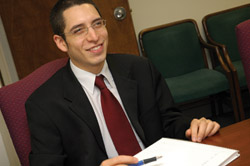
Andrew Brown, BA ’06, is the founder
of The Global Languages Group, which offers
members of the GW community and the general
public access to free language courses taught
by native speakers, most of whom are GW
students.
|
By all accounts, it is a typical Thursday evening
in early May in GW’s Marvin Center. Students
grab a bite to eat and prepare for their last
classes before hunkering down to final papers
and exams. But those who venture to the third
and fourth floors of the student center hear the
sounds of unfamiliar languages floating out of
several meeting rooms. At different points in
the evening one can hear Hebrew, Ukrainian, Swedish,
Polish, Hindi, Croatian, Bosnian, and Serbian.
These are the sounds of GW students teaching their
peers and community members foreign languages.
In October 2005, Andrew Brown,
BA ’06, founded the nonprofit GW student
organization The Global Languages Group, which
offers members of the GW community and the general
public access to free language courses taught
by native speakers. Most instructors are GW students,
but a few members of the D.C. community also volunteer
their time. The group had humble beginnings, with
Brown teaching four of the five classes Global
Languages offered in its first week. By the end
of the school year, the group featured more than
100 student volunteers organizing and teaching
about 55 free classes a week in 35 different languages,
such as Farsi, Urdu, Slovak, Japanese, Albanian,
Indonesian, and American Sign Language. The group
also arranges weekly cultural events, including
embassy visits, foreign film screenings, and lectures.
A volunteer-run organization, Global Languages
receives its funding from the GW Student Association.
The group’s goal is to provide basic cultural
and language knowledge to promote international
communication and understanding.
“Obviously, there is a need and a want
for this, because this is a very international
university,” said Brown.
Most classes are at a beginner level, opening
with such topics as basic vocabulary, grammar,
and common phrases. Nevertheless, if at all possible,
instructors attempt to fully immerse students
in the language by speaking almost exclusively
in their foreign tongue during class. As the courses
progress, instructors move into themed lesson
plans, such as “going out to dinner.”
A team of student volunteers works on developing
a new lesson plan each week for distribution to
instructors. The lesson plans are written in English
and translated by the instructor. Brown says the
lesson plan system, “doesn’t fit every
language or every instructor. This is just something
we give the instructors so that they don’t
feel overwhelmed.”
Brown, who received a Bachelor of Arts in international
affairs from GW in May, has a working knowledge
of 12 languages—he is fluent in at least
six. He caught the language bug after spending
a year studying in France during high school.
Upon his return to the United States, Brown enrolled
in language courses and taught foreign languages
at schools and language institutes. He uses that
experience to personally train each of the Global
Language instructors, which now number more than
70.
In the past four years, Brown has spent time
working and living in France, Ukraine, Egypt,
Turkey, Brazil, and the United Arab Emirates.
Beyond the dozen languages he knows well, Brown
says there are “10 or so languages where
I could get a girlfriend, but I wouldn’t
feel comfortable [with the language] meeting her
parents.”
After a summer working in Korea, Brown says
he intends to return to GW this fall as a graduate
student in public administration and continue
to build The Global Languages Group. “We
teach a lot of languages that are not available
at any institution in the country...I think it’s
really unique.”
—Matt Lindsay

Behind the
Scenes at the Winter Olympics

|
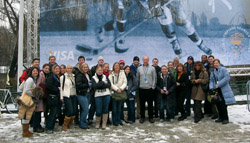
GW Olympic course
participants visit the Visa Olympic Reunion
Center in Torino, where they met with Scot
Smythe, senior vice president of event marketing
for Visa International.
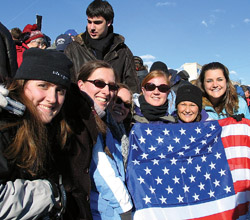
GW Olympic course participants cheer on
U.S. athletes in Torino, Italy.
|
Let the games begin! When those long-anticipated
words were proclaimed this winter in Torino, Italy,
Lisa Delpy Neirotti, director of GW’s master
of tourism administration and sports management
programs, was on familiar turf.
One of the world’s foremost Olympic scholars,
Delpy Neirotti has attended 14 consecutive games
as an international sports management professional,
beginning with the 1984 Winter Games in Sarajevo.
Since joining GW’s faculty in 1991, she
has shared her expertise and contacts with hundreds
of the University’s business students, leading
study abroad courses to the Olympic Games in Barcelona
(1992), Lillehammer (1994), Atlanta (1996), Nagano
(1998), Sydney (2000), Salt Lake City (2002),
and Athens (2004). This year, she took 48 GW students
to Torino as part of her popular three-credit
course, “Behind the Scenes at the Winter
Olympic Games,” a comprehensive, on-site
look at organizing, marketing, and hosting the
international mega event.
For the first time, Delpy Neirotti offered two
sections of the course this spring to accommodate
tremendous student interest. “The pool of
qualified applicants this year was the largest
I’ve ever seen,” states Delpy Neirotti,
who previously capped the course at 28 students.
“Many of them noted in their application
essays that the Olympics course was one of their
primary reasons for choosing GW.” Half of
the group—comprising 45 graduate business
students and three undergraduates—visited
Torino for the first half of the Olympics, while
the second group attended the latter days of the
competition.
The course, which is the only one of its kind,
met about six times on campus prior to the Olympics
and re-convened in Torino, where students met
with a variety of people involved with the games,
including organizing committee executives, International
Olympic Committee members, local government officials,
corporate sponsors, athletes, and media. Delpy
Neirotti also organized VIP tours of the venues
and auxiliary facilities for the group.
“Students were basically on the go all
day for nine straight days,” says Delpy
Neirotti, who also had course participants conduct
spectator research at the Olympics on consumer
behavior, motivation, and customer satisfaction.
“We were invited to a lunch sponsored by
the International Biathlon Federation, where the
group’s president spoke with our students,
as well as to The World Olympian Association’s
reunion center to meet with former Olympic athletes.
The students also visited the Olympic Village,
the International Broadcast Center, and attended
a four-hour sports tourism seminar that I conducted
for sports ministers from around the world.”
Highlights of the 2004 Olympics course in Athens
included an invitation to the home of the U.S.
Ambassador to Greece for a presentation about
security issues, a discussion with Greece’s
Minister of Tourism, a reception on the yacht
of Alexander Spyrou, BBA ’73, whose London-based
airship business was a vendor at the games, and
a reception at a five-star resort sponsored by
John Hancock, an Olympic corporate sponsor.
—Jamie L. Freedman
International
Programs Advisory Council
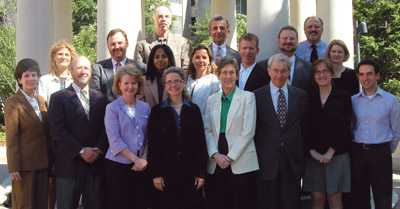
Julie Woodford
The International Programs Advisory Council,
comprising GW faculty members and administrators,
reviews international education for the
University. |
Making a World
of Difference in Asia

|
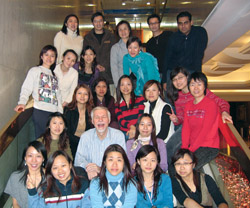
GW professor Michael Marquardt (second row,
second from left) with one of GW’s
human resource development master’s
program classes in Hong Kong.
|
GW’s human resource development master’s
program is being offered at the Singapore Institute
of Management in Singapore and at the Hopkins
Training and Education Group in Hong Kong. Since
its formation, SIM has played a major role in
developing managerial skills and talent to support
the rapid growth of the Singapore economy and
is the leading private human resource development
organization in Singapore. Hopkins is a leading
provider of international degree and nondegree
programs in Hong Kong.
GW’s Human and Organizational Studies
Program is committed to providing world-class,
innovative education for students who are interested
in helping people and organizations succeed in
a world of continuous change. The program focuses
on increasing the learning capacity of individuals,
teams, and organizations to optimize corporate
growth and effectiveness in the Asia-Pacific region
and worldwide. Theory, research, and practice
are balanced throughout the curriculum to enable
students to develop and implement intervention
strategies to increase organizational development
and learning.
“Developing an organization’s human
resources has emerged as a key challenge throughout
Asia,” says Michael Marquardt, professor
of human resource development and director of
the human resource development overseas programs.
“GW’s top-rated HRD program provides
Asian leaders the opportunity of learning about
the best theories—many developed by GW faculty—and
global best practices. Professors benefit as well
as they can bring ideas and practices from Asia
back to their U.S. students.”
The part-time program consists of 12 courses,
offered every six to eight weeks for two years.
The program is designed in such a way that the
participants will not have to be away from their
offices and duties for a long period of time.
The learning approach is based on the direct involvement
of the learner through the use of small groups,
individual assignments, and group projects. Students
have at least 30 hours of direct class time with
the instructor and at least 15 hours of organized
outside work for each course. The program occasionally
awards a doctoral degree, subject to faculty advising
availability and alignment of research interests.
“What are the benefits of the program?
Most importantly, students have access to the
most recent theories, books, and articles, and
the professors who teach the classes are leading
edge academics in the human and organizational
studies field,” says alumna Gail Symons,
director of management and organizational development
at Northern Telecom Singapore. “They achieve
a qualification from a university recognized for
having a world class human resource development
program.”
The Singapore program has just admitted its
10th cohort and has been in operation for 20 years
with a 100 percent graduation rate. Hong Kong
has just admitted its fourth cohort and has been
in operation for six years with an 80 percent
rate of graduation.
—Maureen Ryan
Leonard
Leads Changes in International Student Services
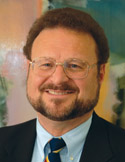 Julie Woodford
Julie Woodford
|

|
It’s no secret that GW is a magnet
for international students and scholars.
The University’s privileged location
in the heart of the nation’s capital,
coupled with its widespread reputation for
excellence, makes it a natural destination
for academics from around the globe. Currently,
1,835 international students call GW home,
along with some 400 foreign professors and
researchers.
GW’s International Services Office,
directed by J. Greg Leonard, plays an integral
role in their journey to GW, helping international
students secure the necessary visas to study
in the United States, as well as to navigate
the subtleties of life here. A long-time,
nationally recognized international student
services professional, Leonard came to GW
last year from Massachusetts, where he served
as director of the international students
and scholars office at Boston University
and acting associate director of the international
office at Harvard University. Earlier in
his career, he founded and served for 20
years as director of international student
and scholar services at the University of
Alabama, Tuscaloosa.
Leonard, who oversees a staff of 15 at
GW, says the field has changed dramatically
over the years. “These days, we spend
a lot of time resolving visa snags and helping
international students comply with federal
regulations,” he explains. Currently,
the office is hard at work implementing
a new software program to meet the government’s
post-9/11 mandate to process and intensively
track all university international visitors
through the federal Student and Exchange
Visitor Information System database.
SEVIS implementation is only one part
of the office’s four-year plan to
update its programs and services. “Our
goal is to personalize, in a much more thoughtful
way, the services that we provide,”
Leonard says. “For example, we plan
to assign international services advisers
to each of the schools in order to provide
a higher level of service to our students.
We’d also like to conduct workshops
and seminars in the various schools and
colleges to reach out to a wider audience.”
Beginning this fall, the International
Services Office will offer a four-day orientation
program for incoming foreign students, supplemented
by special programs, workshops, and activities
throughout the year. “In the past,
we offered a one-day orientation,”
Leonard states. “GW, in my opinion,
has one of the most outstanding undergraduate
orientation programs in the country, and
it’s my goal to create one of the
best international student orientations
nationwide. To me, orientation should be
about survival and getting students started
on the path to acculturation. They are already
dealing with a new language, academic environment,
and way of life, with lots of pressure to
succeed. It’s our job to ease their
way.”
—JLF
The 10 countries with the
largest student enrollment at
GW:
| 1. South
Korea
2. China
3. India
4. Taiwan
5. Turkey
|

|
6. Japan
7. Saudi Arabia
8. Canada
9. United Kingdom
10. France |
|
|
|

GW-Oxford Program
Targets Human Rights

Oxford, England, is the site of the
acclaimed GW-Oxford Program in International
Human Rights Law, which celebrated its 12th
anniversary this summer.
|

|
The picturesque campus of New College in Oxford,
England, provides a captivating setting for the
renowned GW-Oxford Program in International Human
Rights Law, a summer offering devoted to advancing
the cause of human rights. Created and co-directed
by GW Law Professor Ralph G. Steinhardt, the historic
program celebrated its 12th anniversary in July.
This year, 70 students from 20 countries participated
in the popular, month-long series of courses,
co-directed by Andrew Shacknove of the Oxford
law faculty. More than 1,000 students from 85
countries have graduated from the program since
its establishment in 1995.
“In some respects, our graduates make
up the largest Internet-based human rights law
firm in the world,” says Steinhardt, who
oversees an internationally recognized faculty
from around the globe.
A pillar of the human rights curriculum at GW
Law, the GW-Oxford Program emphasizes advocacy
and dissemination skills, as well as formal knowledge
of human rights law, the means of its enforcement,
and its status in a contentious world. Courses
focus on the philosophy, history, doctrine, and
practice of international human rights law. “Participants
come away with an in-depth knowledge of human
rights issues and a better understanding of how
to contribute to the improvement of human rights
conditions in their homelands and around the world,”
Steinhardt says.
Complementing the formal coursework are a series
of afternoon electives addressing contemporary
issues in the field, such as human rights and
peacekeeping, the predicament of populations at
heightened risk of human rights violations (including
women and refugees), and human rights in the marketplace.
Rounding out the curriculum are a human rights
film series and lectures by leading authorities
in the field, including members of the International
Court of Justice and the European Court of Human
Rights, human rights prosecutors, and human rights
abuse survivors.
“The main idea behind establishing a world-class
summer school in human rights was to show that
it is meaningful to speak of a human rights lawyer,
just as prior generations had spoken of a tax
lawyer or a real estate lawyer,” says Steinhardt,
who was recently the only American appointed by
the International Commission of Jurists in Geneva
to its Expert Legal Panel on Corporate Complicity
in International Crimes. “Especially with
the proliferation of human rights cases in domestic
courts, human rights has stopped being a field
about aspirations exclusively and become a field
with doctrines and institutions that lawyers can
use to try to improve human rights conditions.”
Over the years, GW-Oxford’s distinguished
faculty has included leading human rights law
practitioners such as Harold Koh, dean of Yale
Law School; Richard Goldstone, first prosecutor
at the Yugoslavian and Rwandan War Crimes Tribunal;
Justice Albie Sachs, a founder of the anti-apartheid
movement in South Africa and now a member of that
country’s Constitutional Court; Radhika
Coomarawamy, U.N. Special Rapporteur on Violence
Against Women, and Juan Mendez, former president
of the Inter-American Commission on Human Rights
and now the U.N. Secretary-General’s Special
Representative on Genocide.
Many GW-Oxford program alumni have gone on to
accomplish great things in the field. “Some
are working with the Organization of Security
and Cooperation in Europe as election observers
and advocates for the protection of indigenous
peoples and minorities,” Steinhardt says.
“Others now work in the largest law firms
in America representing torture survivors. A number
have gone on to work or intern in the prosecutor’s
office at the ad hoc tribunals for Yugoslavia
and Rwanda. Several have become teachers of international
human rights law. Together, they are spreading
the message that human rights is not a matter
of utopian moralizing but is a body of doctrine
and practice that can be enforced in domestic
courts, international institutions, and the marketplace.”
—JLF
Have
Experience, Will Travel
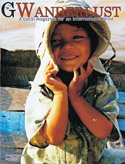 Like
many students aspiring to a career in journalism,
juniors Jillian Badanes, Ann Blake, Stephanie
Robichaux, and Keisha Vaughan were frustrated
by the discipline’s catch-22: Gaining
an internship is nearly impossible without
experience, and experience is almost impossible
to obtain without an internship. So the
students, who met in professor Myron Belkind’s
introductory journalism class, took matters
into their own hands by founding and editing
GWanderlust, a travel magazine
designed for the campus community. Like
many students aspiring to a career in journalism,
juniors Jillian Badanes, Ann Blake, Stephanie
Robichaux, and Keisha Vaughan were frustrated
by the discipline’s catch-22: Gaining
an internship is nearly impossible without
experience, and experience is almost impossible
to obtain without an internship. So the
students, who met in professor Myron Belkind’s
introductory journalism class, took matters
into their own hands by founding and editing
GWanderlust, a travel magazine
designed for the campus community.
The first issue, published in May, is
as varied in tone as it is in the geography
it covers. Stories from students, professors
and alumni explore destinations as somber
as the mass graves at Phnom Penh, Cambodia,
and as festive as the Winter Olympics in
Torino, Italy. Contributors recount adventures
such as traveling along the Lebanese-Israeli
border and teaching Paraguayan children
how to do the hokey-pokey.
While it has provided them valuable experience,
Badanes, Blake, Robichaux, and Vaughan don’t
view their magazine as a mere tool for career
advancement. As they see it, GWanderlust
is chiefly a means by which members of the
GW community may begin to feel more connected—both
to each other and to the wider, weirder
world. “The world is a big and scary
place,” write the editors in their
introductory letter. “Only through
understanding can it become smaller and
less formidable.”
—Ruth Steinhardt |

GW Women in the
Middle East

|
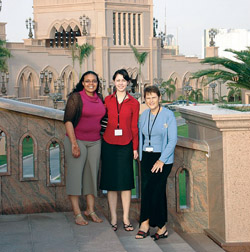
GW students Amalfi
Parker and Catherine Villnave join Rachelle
Heller, associate dean for academic affairs
at GW’s Mount Vernon Campus, outside
the Emirates Palace in Abu Dhabi, United
Arab Emirates, during the second international
Women as Global Leaders Conference.
|
The stereotypical image of the Muslim woman was
shattered for 12 GW professors and students this
spring, when a select delegation from the University’s
Women’s Leadership Program traveled to Abu
Dhabi, United Arab Emirates, for the second international
Women as Global Leaders Conference. Led by Rachelle
Heller, associate dean for academic affairs on
GW’s Mount Vernon Campus, the group joined
more than 1,000 prominent women leaders from 87
countries for a cross-cultural discussion on women
and global leadership.
GW’s contingent, including Mary Buckley,
coordinator of the WLP’s international arts
and culture program; graduate teaching assistant
Meghan Shea, BA ’04; and nine undergraduates
signed on for the conference after submitting
two successful proposals to serve as presenters
at the gathering.
The group’s panel discussion, “Beauty
is in the Eye of the Beholder: Stakeholders View
of WLP,” probed the Women’s Leadership
Program—based on the Mount Vernon Campus—from
various points of view. They also headed up a
well-attended roundtable discussion, “Are
Only Extraordinary Women Capable of Being Global
Leaders?”
The three-day event featured an impressive roster
of guest speakers, including Her Majesty Queen
Rania Al-Abdullah, Queen of the Hashemite Kingdom
of Jordan; Hon. Mary Robinson, former president
of Ireland and U.N. High Commissioner for Human
Rights; Cherie Booth, wife of U.K. Prime Minister
Tony Blair and noted British attorney and human
rights advocate; and Linda Ellerbee, award-winning
journalist and television producer.
“The speakers were unbelievable,”
Heller says. “They were an amazing combination
of top women leaders, and interacting with them
was an extremely broadening experience for our
students.”
Heller notes that the students gained much from
informal conversations with their counterparts
from around the world, transcending culture and
distance to bond as friends. “You think
that because women are wearing black abayas
[long over-garments] and veils that they don’t
have many issues in common with us, but they do,”
she says. “We learned that all of us are
more alike than we are different, and that it’s
the differences that make us interesting.”
The group also visited Zayed University, a women’s
college with campuses in Dubai and Abu Dhabi,
which hosted the conference. GW has a special
link to the university, as C. Dianne Martin, professor
of engineering and applied science, is currently
serving for two years as dean of Zayed’s
College of Information Systems.
Everyone came away from the experience eager
to continue the engaging global dialogue. “The
conference presented our students with a wonderful
opportunity to join a worldwide community of scholars,”
Heller says.
Shea says the trip will stay with her for a
long time. “Dubai is a central spot in U.S.
diplomacy and business interests, so it was timely
and incredible to be there,” she states.
“The program had a huge impact on all of
us and created a greater awareness of the need
for more opportunities like this to network and
exchange leadership ideas with our counterparts
in the Middle East and around the world.”
—JLF
Taking
Flight in Taiwan
GW’s department of engineering management
and systems engineering recently completed
a successful project with the Republic of
China Air Force in Taiwan. GW offered an
engineering management Master of Science
degree program with a focus on logistics
management to select ROCAF officers. After
being nominated by their superiors and meeting
GW’s entrance requirements, 57 Taiwan
Air Force Academy graduates earned GW master’s
degrees. The program utilized the cohort
model, whereby all students attend all classes
together in sequence.
Shahram Sarkani, professor of engineering
management and systems engineering and head
of the department’s off-campus programs,
administered the program and served as faculty
adviser to the students. Collaborating with
Sarkani throughout this program was professor
Thomas A. Mazzuchi, department chair. Faculty
members with a solid grounding in the daily
application of their knowledge to government,
industry, and military issues taught the
courses. The program, offering 24 courses
over four years, ran from January 2002 through
December 2005.
“ROCAF promised to send GW their
best and brightest officers, and they did,”
Sarkani says. “We provided ROCAF with
education in a field that directly supported
its mission. At the same time, teaching
in Taiwan gave GW administrative and instructional
staff valuable insight into essential educational
and cultural traditions in Taiwan.”
Because GW took the program to Taiwan
and used American instructors, the ROCAF
gained an American education for its handpicked
officers without having to send them overseas.
Timothy W. Tong, dean of GW’s School
of Engineering and Applied Science, traveled
to Taiwan a number of times to support the
program. And in June of 2005, GW Executive
Vice President for Academic Affairs Donald
R. Lehman led a delegation to Taiwan, accompanied
by Tong, Mazzuchi, and Sarkani. Together
they joined goodwill meetings with students,
program officers, and the Republic of China
Ministry of Education.
Conducting the program on site in Taipei
and Tainan earned GW recognition among many
people in the area, helping to make known
the academic reputation of the University.
Subsequently, GW’s name recognition
led to the launch of another cohort master’s
program in Taiwan in 2003, this one in cooperation
with the China Industrial & Commercial
Research Institute in Taipei. The CICR program
is ongoing, with the fourth cohort to begin
in Fall 2006.
“GW’s home in Washington,
with its populace from every corner of the
globe, makes it a natural citizen of the
world,” Sarkani says. “The opportunity
for GW to offer education and academic research
programs in Taiwan allows the University
to strengthen its credentials as a global
citizen.” |

Med Students
Ship Textbooks to Africa
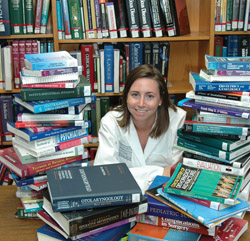
Amy Fiedler, a second-year medical
student, collaborated with other medical
students to form Books Without Borders after
traveling to the African nation of Eritrea
and seeing the limited number of available
medical textbooks there.
|

|
Imagine going through medical school and sharing
an anatomy textbook with nine other students.
This is the reality for men and women at the Orotta
School of Medicine in Eritrea, located in Eastern
Africa bordering the Red Sea, Sudan, and Ethiopia.
Books Without Borders, a GW medical student organization
whose goal is to annually donate medical textbooks
and literature to medical schools in areas of
need, is working to provides books to Orotta students.
The idea developed after Amy Fiedler, as a first-year
medical student, traveled to Eritrea in the summer
of 2005 and saw the limited number of available
medical books and journals. “These students
are just as passionate as us but don’t have
the same available resources,” Fiedler says.
“Everyone has a different way of learning
and everyone needs his or her own textbooks.”
After collaborating with other first-year medical
students, Books Without Borders began to take
shape.
The massive book collection began in early January
2006 with donation boxes scattered throughout
Ross Hall and the Himmelfarb Library. During the
following five months, Books without Borders collected
more than 1,000 books and 5,000 journals. “These
donations far exceeded our expectations,”
Fiedler says. Books Without Borders aims to eventually
establish the first medical library in the country
of Eritrea and reduce the student-to-book ratio
to four to one.
“It furthers the overall collaboration
we have had for some time at the Medical Center,”
says Dr. James Scott, dean of GW’s School
of Medicine and Health Sciences. “This particular
project takes on an entirely new dimension. Most
importantly, this project comes completely from
the students. Amy has put so much time and energy
and done so much. I am proud of our students.
They took this project and ran with it. It is
a tremendous success.”
“Africa has been a neglected continent
for far too long,” GW Provost and Vice President
for Health Affairs John F. Williams remarks. “The
passion of the students and their work to make
this project a reality for Eritrea demonstrates
a commitment we all can follow.”
Physicians for Peace also rallied behind the
cause by packaging and shipping all donated materials
free of charge to Eritrea in late May. Distribution
and organization of the books will be a daunting
task, but Fiedler hopes GW will be able to offer
some assistance. “We could never have done
this without the support of everyone at GW,”
Fiedler says. “I am really thankful that
people think this is a worthy cause.” Fiedler
explains that Himmelfarb “has been absolutely
critical.” The library volunteered to store
all the books and journals until shipment time.
In addition, Books Without Borders has had enormous
support from the Medical Center administration,
the International Medical Programs Office, and
current students.
Books Without Borders is developing relationships
with other medical schools in the greater Washington
area. In its second year of operation, Books Without
Borders will explore the possibility of publishing
companies donating new medical books or complete
sets as it continues to collect donations for
underserved medical schools.
—Sarah Freeman
Murrow
Honored in England
In February, a contingent of GW community
members traveled to England to honor American
journalist Edward R. Murrow (1908-1965),
with an English Heritage Blue Plaque. GW
was represented at the ceremony by Michael
Freedman, vice president for communications
and former CBS Radio Network News general
manager; Richard C. Hottelet, a member of
the “Murrow Boys” who covered
World War II for CBS Radio, now a GW Welling
Presidential Fellow; and Sam Litzinger,
former CBS News correspondent, an anchor
on Washington Post Radio now host of the
GW-produced XM Satellite Radio series “From
the Nation’s Capital.” Litzinger
nominated Murrow for the honor.
The plaque was placed at Weymouth House,
84-94 Hallam Street in London, where Murrow
lived from 1938 to 1946. GW students studying
in England during the spring semester and
alumni living abroad were among the guests
at the ceremony. Also in attendance was
Daniela Passolt Olimpio, resident director
of GW's England Study Center. |

Student Journal
Celebrates 15 Years
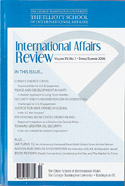 In
1991, the Internet was in its infancy, the former
Soviet bloc was fading into the global background,
and hope was high for a new world order. Meeting
the need for a forum for student scholarly discussion
of the rapid changes taking place in an increasingly
globalized society, GW’s International
Affairs Review was born. While the world’s
most pressing issues may have changed since 1991,
IAR remains a premier journal for graduate
students around the world to publish their theories
on economics, development, security, and technology
on an international level. In
1991, the Internet was in its infancy, the former
Soviet bloc was fading into the global background,
and hope was high for a new world order. Meeting
the need for a forum for student scholarly discussion
of the rapid changes taking place in an increasingly
globalized society, GW’s International
Affairs Review was born. While the world’s
most pressing issues may have changed since 1991,
IAR remains a premier journal for graduate
students around the world to publish their theories
on economics, development, security, and technology
on an international level.
The publication is a graduate student-run scholarly
journal published biannually. Now in its 15th
year, the journal strives to remain on the pulse
of current and future trends on the academic global
scene. A peek into current topics for the Spring/Summer
2006 issue reveals that the journal addresses
a wide variety of topics from maritime piracy
to terror groups.
“By bringing scholarly weight and analytical
rigor to bear on real-world problems, this journal
has made real contributions to our understanding
of these issues,” says Elliott School of
International Affairs Dean Michael Brown.
As a scholarly journal published in the very
city where most major international decisions
are made, IAR and its panel of editors
can track current academic trends in international
affairs and provide decision makers with possibilities
for alternative solutions to potentially catastrophic
dilemmas.
“IAR provides policy analysis
of today’s events from the perspective of
tomorrow’s leaders by publishing articles
selected from submissions by members of international
affairs graduate student communities worldwide,”
says Adele Waugaman, former editor-in-chief. “In
addition to its articles, which provide forward-looking
analyses of international policy issues, IAR
also regularly features a book review section
and an interview with a leading policymaker or
a spotlight on an Elliott School professor.”
To celebrate 15 years of publication, the journal
has expanded its scope to include sales on amazon.com
and has utilized its Web site to provide a space
for archives of past journals. As society becomes
increasingly interconnected, publications like
the IAR will ensure that GW’s academic
community stays on top of international research.
—Adela de la Torre

World-Class
Performances at Lisner Auditorium

|
(Left) Flamenco performer and choreographer
Sara Baras (Right) African music singer Dobet
Gnahoré |
GW’s Lisner Auditorium presents many talented,
diverse individuals and groups who entertain and
inspire. Listed here are a few such performances
that demonstrate the international flavor of Lisner’s
offerings:
- Dobet Gnahoré, a performer with the
Acoustic Africa tour, will make her DC debut
at Lisner Auditorium Nov. 12. She sings in several
African languages and was trained in the music
and dance traditions of the Bété
people in her native Ivory Coast by her father,
Boni Gnahoré, a well-known performer
in West Africa.
- As part of Lisner’s presentation of
the critically acclaimed annual D.C. Flemenco
Festival, Flamenco superstar and choreographer
Sara Baras performs in a popular show that attracts
much attention, including media coverage from
the Andalusia region of Spain.
- Daniela Mercury, the Brazilian superstar
known as the “Queen of Axé music,”
performed at Lisner in October as part of the
“True Rhythms” series, which also
included a performance by Peruvian vocalist
Eva Allyón.
- Khaled, the “King of Raï,”
performed music at Lisner that has its origins
in Bedouin oral traditions. Khaled helped transform
and electrify the raw music style in his native
Algeria and then went on to make it part of
the global music scene.
To view performances scheduled for the upcoming
season, visit www.lisner.org.

The World is
a Stage
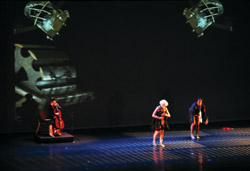
Dance professor Maida Withers’
latest dance creation, Thresholds Crossed.
|

|
Walking into Maida Withers’ office on the
second floor of the Marvin Center, one is greeted
by an eclectic collection of memorabilia from
her dance-related trips around the globe—a
poison arrow from Brazil, a Korean mask, trinkets
from Africa. “Every time I look at them,
they remind me just how full my life is,”
says the renowned professor of dance.
The world has indeed provided a colorful backdrop
for Withers’ acclaimed dance creations.
Equally comfortable holding open auditions in
Moscow to cast dancers for her new production,
Thresholds Crossed, or staying up all
night in Finland with top scientists to search
for auroras—the mystic luminaries of the
Arctic skies, as inspiration for her “Dance
of the Auroras,” Withers has carved out
a unique niche for herself in the post-modern
dance movement. As she celebrates her 40th year
at GW and the 30th anniversary of her acclaimed
Washington dance troupe, The Dance Construction
Co., Withers has no intention of slowing down.
April 21 marked the world premiere of Thresholds
Crossed, Withers’ new dance creation,
presented by GW’s Lisner Auditorium. A kinetic
fusion of East and West, the evening-length, multimedia
dance work explores the events, ideology, and
humanistic issues that link the United States
with the former Soviet Union and contemporary
Russia. Featuring U.S. and Russian dancers, the
work is a culmination of Withers’ 11 research
tours to Russia since 1997.
“Russians and Americans share deeply held
values inherent in honor and patriotism, values
often won through struggles associated with conflicts
and war, both historic and current,” Withers
says. “In Thresholds Crossed, we
dance together in a physical and emotional work
that examines the violence of war, love of country,
passion for freedom, and sorrow for loss—a
journey into places where thresholds are crossed.”
A fastidious researcher, Withers’ willingness
to take a risk and her passion for venturing out
into the world to find material for her work has
fueled myriad groundbreaking choreographic expeditions
over the years. “The path I’ve taken
is not for the lighthearted,” she quips.
“I love a challenge. Reviewers say that
I never hesitate to plunge off the cliff into
the deep abyss.”
During her tenure at GW, Withers has constructed
more than 75 original dance works and has received
numerous awards, including the 1999 Columbian
Professorship Award, the prestigious Pola Nirenska
Lifetime Artistic Achievement Award in 2001, a
Fulbright Travel Award to Taiwan, and the distinguished
2005 D.C. Mayor’s Arts Award for Excellence
in an Artistic Discipline. She has performed,
conducted dance workshops, and published in 17
countries, including Korea, China, and Brazil.
At press time, Withers was arranging an April
2007 multicity tour of Thresholds Crossed
in Russia.
—JLF
|